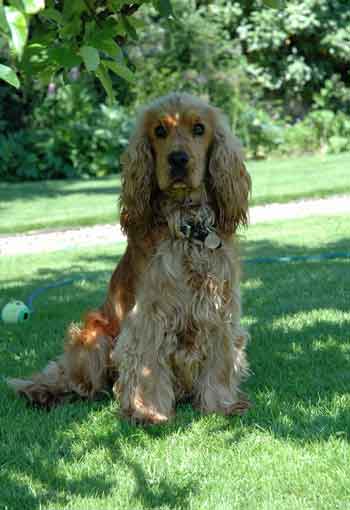- Home
- Best quality dog food
- Homemade dog food
Homemade Dog Food:
Why Not Make Your Own?
What can be better than homemade dog food? Lovingly prepared with good quality ingredients, to give your Cocker Spaniel boundless energy and vitality as well as improving his health! What's not to like?
Healthier Homemade Dog Food
More and more owners are choosing to feed their pets homemade dog food.
Preparing healthy nutritional meals from scratch means you know exactly what goes into your pet's food and whilst it may be a little more time consuming than opening a tin or a packet, the additional benefits for your dog make it well worth the extra effort.
Why Homemade Is Best
In the past, there have been many dog food recalls, but unfortunately for some of our pets these recalls came too late and in 2007, at the height of the problem, many pets became sick and sadly many died.
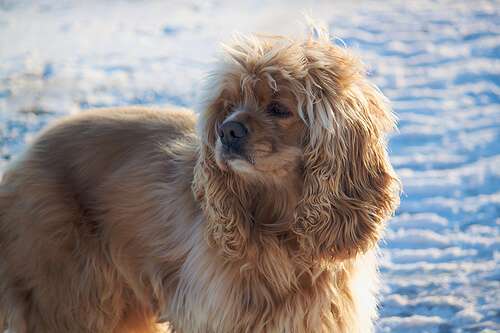 My Mum makes homemade dog food for me!
My Mum makes homemade dog food for me!Eventually it was discovered that some pet foods were contaminated with melamine which was causing kidney failure.
Thankfully many dog food manufacturers have learned from their mistakes and are continually improving the quality of their ingredients and manufacturing processes; however, many have yet to get it right - which is one of the reasons why the homemade dog food diet is still popular today.
Take a look at the ingredients listed on manufacturer's packaging. You may be shocked to see how much of the food is stuffed with 'fillers' (such as corn) and how many artificial chemicals, colouring, and preservatives it contains!
By making your own homemade dog food you know exactly what goes into it - nothing but fresh, good quality ingredients to help your Cocker Spaniel's coat and eyes shine, keep his skin clear and healthy, and give him strong bones, teeth, and lean muscle.
Homemade dog food prepared with fresh, good quality ingredients will help your Cocker to live a
happier and healthier life - now that works for me!
Homemade Dog Foods: Ingredients?
So, what can I feed my pet?
The short answer is...the best quality ingredients you can afford!
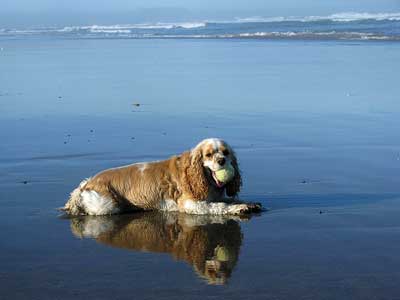 I love this beach Mum!
I love this beach Mum!Basically a healthy homemade dog food diet is made up of proteins, in the form of human grade meat, fish or eggs, fresh vegetables for vitamins and minerals, essential oils and fats, and oatmeal, pasta, rice or potatoes for carbohydrates.
Proteins:
Proteins can be found in meat and fish such as, lamb, beef, rabbit, turkey, chicken, pork, offal (including green tripe), salmon, sardines, mackerel, herring and tuna. Any of the tinned fish (preferably in water), bones and all, is ideal.
Beans and eggs are also packed full of protein, although they should be used in moderation.
I occasionally give my Cocker Spaniel a scrambled egg mixed with white or brown rice and a few vegetables (cooked or raw, it doesn't matter) - he's not interested in the nutritional value; to him, it simply tastes good!
Essential Fats and Oils:
Essential fats and oils can be found in oily fish, nuts, grains, vegetables, and most meats, but take care, too much fat in his diet can lead to him becoming overweight so if you're to keep your Cocker Spaniel trim, keep a close eye on fat levels in his diet.
Vegetables:
Fresh, healthy vegetables such as potatoes (peeled), carrots, cauliflower, Brussel sprouts, cabbage, baby spinach, pumpkin, sweet potato, parsnips, peas, asparagus, celery, peppers, cucumber and broccoli will provide your dog with essential vitamins and minerals and some carbohydrates.
Watch out though, too much cauliflower or broccoli can give your dog gas!
Max loves red pepper and peas mixed with his rice, add to that a small tin of sardines or tuna and dinner's ready!
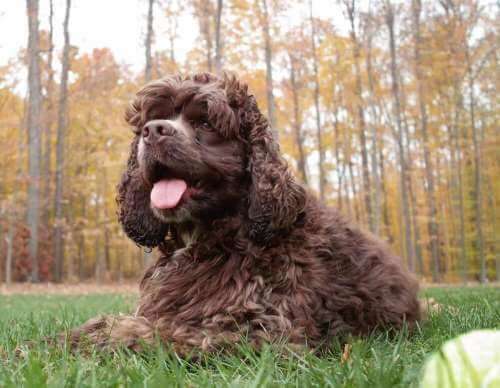 Chocolate cocker spaniel lying on the grass, panting
Chocolate cocker spaniel lying on the grass, pantingCarbohydrates:
Any of the above foods can be mixed with whole grains, (only if your dog doesn't suffer from allergies) oatmeal, white or brown rice, (or a mixture) barley, pasta, quinoa, potatoes or couscous to provide a satisfying, well-balanced, nutritional meal.
All these will need to be cooked first in plenty of unsalted water and no oil, possibly with the exception of the oatmeal.
Flavorings:
Don't be tempted to add salt or any other flavourings to your Cocker Spaniel's diet. He doesn't need it and too much salt in a dog's diet isn't good for him. For extra flavour, it's safe to add fresh or dried herbs, such as parsley or rosemary.
Vitamin and Mineral Supplements:
If you're worried that your dog is not getting enough nutrition from his diet (oils, vitamins, minerals), you can buy specially prepared omega oils for dogs, as well as vitamins and supplements from most good pet stores.
Let your vet know that you're planning to feed your Cocker on homemade dog food and ask him to recommend something for you rather than just going out and buying it yourself.
I'd also check your dog's weight against his ideal weight and monitor it regularly - if he begins to put on a little beef, or he's over his 'ideal weight' you can either exercise him more or reduce the food you give him.
Dairy Produce:
Don't feed your pet with foods high in butter or feed him too much cheese - they're not good for him and can cause pancreatic problems, although the occasional morsel won't harm him.
Cottage cheese and yogurt can be used in his diet but only in small quantities, for example a tablespoon or two of yogurt will help to moisten a meal.
Homemade Dog Food Ratios
This is where it can get confusing because there are many differing
recommendations out there from so called experts. Even most vets can't
agree on ideal ratios of protein, vegetables and carbs!
Important Note: Puppies and nursing bitches require slightly different ratios to ensure their bodies get the correct levels of nutrition. Puppies, for example, will need around 29% protein while their bodies are developing and growing.
I'm not an expert and I don't claim to be, however, when I prepare Max's food I use the following ratios: between 18 and 20% protein, (he's 11 years old and castrated so needs less protein, however he's exercised off-lead for around 75 minutes each day).
I feed him an equal measure of vegetables and carbohydrates (35:35) although I often vary that depending on how much exercise he's had, and I make sure his diets contains around 10% fat.
I don't feed him homemade food every day. He gets kibble when I'm too busy to cook or prepare meals for him and we're both happy with that.
But you must do what's right for your dog, so take a wander over to your vets and have a chat with him to enable you to decide what's best for your pet, including how much (weight wise) your pet needs for his stage in life!
As a general guide, 2/3% of his recommended body weight sounds about right. So, for example, Max's recommended weight (as defined by our vet) is 13 kg, which means I feed him between 260 and 390 grams of homemade dog food each day.
Types Of Homemade Dog Foods
If you decide making dog food is something you'd enjoy, there are many types of diet to choose from.
There's the organic diet where all ingredients used are natural and grown organically.
The animals have led a good life, usually raised free range and without the use of growth hormones or antibiotics, and vegetables are grown free from pesticides, insecticides or fertilizers.
The natural dog food diet is very similar to the organic except the ingredients are not necessarily organic.
Then there's the raw food diet, which is sometimes also known as the 'BARF' diet. It consists mainly of raw meat and bones and can include a small amount of raw fruit and vegetables. Eggs, including the shells, cottage cheese and plain yoghurt may be included because they're an excellent source of calcium.
Holistic dog food
takes care of the entire body and raises the overall level of health. Also known as natural dog food it also contains high
quality ingredients without artificial flavours, colours, or preservatives.
Tips For Preparing Homemade Dog Food
Before you begin making your own homemade dog food, it's essential that you know which of our everyday foods can actually poison your dog so you can exclude them from his diet.
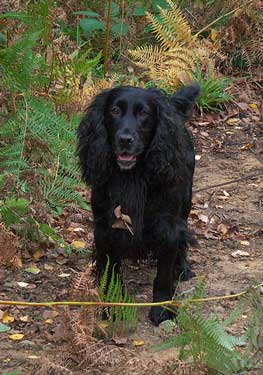 Beautiful cocker walking through ferns
Beautiful cocker walking through ferns- Cooked bones become brittle and prone to splintering and can easily choke your pet or puncture parts of his digestive system. If you'd like to feed
your dog a juicy bone, make sure it's uncooked and always supervise him.
- When preparing
your dog's food, particularly if it's raw, it's essential to keep all work surfaces and kitchen utensils bacteria free. Personally, I always use an anti-bacterial spray. That way I know I'm safe.
- When changing any diet, it's best not to do it overnight. Begin mixing the existing
diet with a little of the new food that you've prepared and gradually
increase the homemade dog food and decrease the commercial food until
the transition has been made.
- Always rotate your homemade dog food
recipes to make sure your pet gets a wide variety of foods and has a
well-balanced nutritional diet.
- At
the beginning of the week I usually make up a batch of homemade food. I put it in an airtight container in the refrigerator and it stays
fresh for up to 5 days.
I also freeze portion-sized batches and defrost overnight for the next day.
If you'd like to see a selection of tasty, healthy homemade dog food recipes (and more here) that are a hit with Max, just follow the link.
Important Note About Making Your Own Dog Food:
It's important to understand that not all dogs have the same nutritional needs. Simply throwing together scraps of meat and leftover dinner from family meals won't necessarily form a healthy, nutritious diet.
Talk to your vet and let him know what you're planning. He'll give you advice that's relevant to your pet and can help you plan your Cocker's meals - he may even have some delicious recipes to pass on too!
If you've got a favourite homemade dog food recipe, why not share it with us?
Photo Credits: Homemade Dog Food
1. Gerry Tuchodi at Flickr.com - https://www.flickr.com/photos/tuchodi/4123013601
2. Jeremy McWilliams at Flickr.com
3. Tom Hart at Flickr.com - https://www.flickr.com/photos/37089490@N063/643252445
4. Skinbops at Flickr.com

